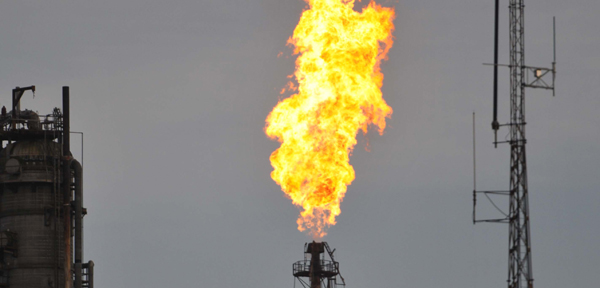
DEQ spokesman says sizeable release of volatile compounds occurred after flare was damaged
The Louisiana Bucket Brigade is calling Motiva Enterprises Norco Refinery’s decision to not shut down operations in the face of Hurricane Isaac last August irresponsible.
A report released by Motiva in April, nearly seven months after the incident, detailed the emergency shutdown of the plant and the unpermitted release of emissions due to a flare on one of the plant’s stacks being blown out by high winds.
Anna Hrybyk, program manager at the Louisiana Bucket Brigade (LABB), said Motiva should have shut down operations to prevent the problems that cropped up during the hurricane and the ensuing emergency shut down.
“If you know that the hurricane is coming towards you, you should have a controlled shutdown,” she said.
In contrast, the Valero refinery in Destrehan went through shut down procedures prior to Hurricane Isaac making landfall and reported zero emissions.
“Valero shut down, but Motiva didn’t. You can see a difference between what happened just in those two reports,” Hrybyk said.
Rochelle Touchard, manufacturing communications and social performance manager at Norco Manufacturing Complex, said the decision to not shut down the plant was well founded and based on information provided by weather forecasts.
“Based on the potential threat, facilities have several options including making minimal preparations, reducing unit rates or initiating a complete shutdown. The Norco Manufacturing Complex makes its decisions based on the severity and projected path of a storm,” she said. “At that point, a hurricane ride through crew is established and only essential employees remain on site to keep the facility running or prepare for shutdown.”
Hurricane Isaac first made landfall on the evening of Aug. 28. On Aug. 29 at 3 a.m. the Motiva flare was blown out and according to the Louisiana Department of Environmental Quality (DEQ) it remained out until 3 p.m. During that time 5,686 pounds of volatile organic compounds (VOCs) were released into the atmosphere without first being treated.
Volatile organic compounds include known carcinogens such as benzene as well as other chemicals known to cause health problems.
“During normal flare operations, Motiva utilizes the 99.5 percent flare combustion efficiency. However, because we could not verify that the pilot was lit during this brief unusual period, we considered all emissions from the flare during this time period un-combusted and reported them as such to DEQ,” Touchard said.
Rodney Mallett, communications director for DEQ, said the releases occurred for only 26 minutes spread out over the 12-hour period and were above permitted levels.
“Those were pretty sizable releases at that time,” he said.
A worker on staff at the time of the hurricane, who asked for anonymity due to fear of retaliation, said it is routine for Motiva to stay open during hurricanes and that the plant shutting down for Hurricane Katrina was the only known exception.
“They made the decision during Hurricane Isaac, based on the information they got from their weather service, to slow down the units and not shut them down,” the worker said.
However, when the power went out in the area the worker said an order was given for an emergency shut down and employees had to work outside during the hurricane to complete the shut down.
“We lost power and that necessitated an emergency shut down. Guys were out shutting down the units in 45-mile-per-hour winds after we lost power,” the worker said. “A 45-mile-per-hour wind may not seem like a whole lot until a two by four or other debris comes flying at your head.”
The worker had harsh words for management who put employees in danger.
“It’s very uncomfortable to be in the position where you are being put in harm’s way by somebody who is not out in the units. You know you can’t rely on the electrical grid here,” the worker said. “It’s the almighty dollar…they want to make that buck. Risk management they call it – we take the risk and they manage it.”
Although the parish was under a mandatory evacuation, the plant was exempt from the order and allowed to maintain operations.
DEQ does not have the ability to shut down plant operations in the face of a hurricane.
“If there are continual violations or threat to humans or health we can shut them down, but not for weather emergencies,” Mallett said.
Mallett said the only governmental agencies who can order a plant shut down for weather emergencies are local authorities.
“That is going to be law enforcement and parish emergency operations authorities,” he said. “We don’t have any authority to make somebody evacuate.”
Touchard said the exempt status for plant employees during a mandatory evacuation was only recently granted.
“St. Charles Parish’s current evacuation order exempts essential personnel of local government and local industry,” she said. “This change, as per St. Charles Parish Emergency Preparedness Director Ron Perry, was made to avoid ambiguity in cases where industrial employees are being asked to evacuate as parish residents and to remain as part of plant shut-down crews.”
However, DEQ does have the ability to require industrial plants to report releases in a timely manner.
LABB questioned why the DEQ allowed Motiva so much time to put together a report on the incident.
“In (Motiva’s) seven, 30 and 60 day investigation follow-up letters they released a laundry list of emissions releases, but they said they were still doing calculations to figure out how much was released,” Hrybyk said. “How can they be calculating that a year later?”
Mallett said the extensions granted to Motiva were understandable given that a disaster declaration was made for the parish after the hurricane.
“As far as regulations go it says you can get an extension if you meet the guidelines,” he said. “After the hurricane there is a lot going on. They were saying ‘we are investigating.’ They are doing these calculations and trying to come up with these numbers.”
Touchard also said Motiva met all reporting requirements.
“We supplied the DEQ with routine updates, met all reporting obligations while this review was underway, and submitted the full report within the DEQ’s reporting timeframe,” she said. “As part of this review, we conducted a detailed review of all potential emissions sources to ensure that flaring emissions were calculated and reported accurately for this unique event.”
The incident is still under investigation by DEQ and the decision on any action is still pending.
“There is no timeline on these things,” Mallett said. “We will probably have to read through the report and are requesting some calculations on this and we are going to be doing some (calculations) of our own.”
Mallett said the matter will likely be resolved in the court system and possibly with the assistance of the Environmental Protection Agency, but that a fine will not necessarily be levied on Motiva.
“We take action as is necessary. We have certain rules we have to follow. It is not a speeding ticket,” he said. “Sometimes it is a compliance order that says here is what you did wrong and this is what you can do better and there is no penalty.”




Be the first to comment